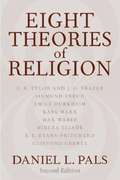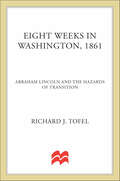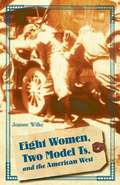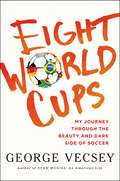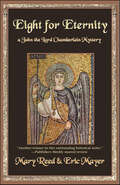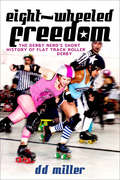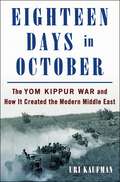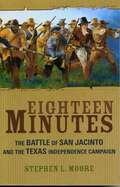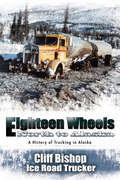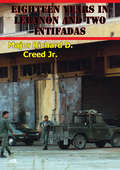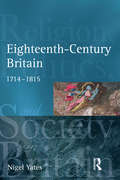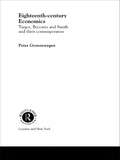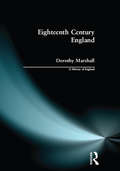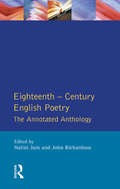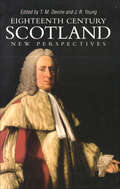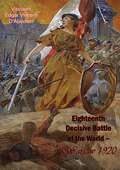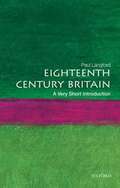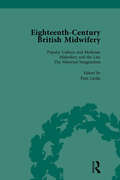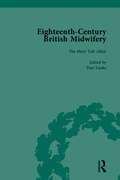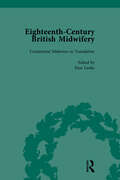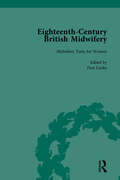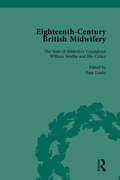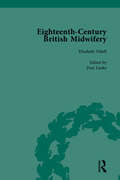- Table View
- List View
Eight Theories of Religion (Second Edition)
by Daniel L. PalsEight Theories of Religion, Second Edition, begins with Edward Burnett Tylor and James Frazer--two Victorian pioneers in anthropology and the comparative study of religion. It then considers the great "reductionist" approaches of Sigmund Freud, Emile Durkheim, and Karl Marx, all of whom have exercised wide influence up to the present day. The discussion goes on to examine the leading challenges to reductionism as articulated by sociologist Max Weber (new to this edition) and Romanian-American comparativist Mircea Eliade. Finally, it explores the newer methods and ideas arising from the African field studies of ethnographer E. E. Evans-Pritchard and the interpretive anthropology of Clifford Geertz.
Eight Weeks in Washington, 1861: Abraham Lincoln and the Hazards of Transition
by Richard J. TofelA close look at the first eight weeks after Abraham Lincoln took office on March 4, 1861, reveals a time when the fate of the nation's capital, certainly of the Lincoln Administration, and perhaps of the nation itself, seemed very much in doubt.This is a story of a president uncertain and sometimes amateurish, of a man not yet fully recognized as a legitimate leader, of an executive anxious to the point of illness, of a beleaguered figure, occasionally despairing, but also starting to find his footing. Lincoln himself soon remembered it as the most troubled and anxious time of his life, one that might actually have threatened his physical survival. In a sense, it is a story of Abraham Lincoln the human being beginning to become the Abraham Lincoln we now recall.
Eight Women, Two Model Ts, and the American West
by Joanne WilkeIn 1924 eight young women drove across the American West in two Model T Fords. In nine weeks they traveled more than nine thousand unpaved miles on an extended car-camping trip through six national parks, "without a man or a gun along." It was the era of the flapper, but this book tells the story of a group of farm girls who met while attending Iowa's Teacher's College and who shared a "yen to see some things." A blend of oral and written history, adventure, memoir, and just plain heartfelt living, Eight Women is a story of ordinary people doing extraordinary things. Weaving together a granddaughter's essays with family stories and anecdotes from the 1924 trip, the book portrays four generations of women extending from nineteenth-century Norway to present-day Iowa-- and sets them loose across the western United States where the perils and practicalities of automotive travel reaffirm family connections while also celebrating individual freedom.
Eight World Cups
by George Vecsey<p>On the eve of the 2014 World Cup, New York Times sports columnist George Vecsey offers a personal perspective on the beautiful game Blending witty travelogue with action on the field--and shady dealings in back rooms--George Vecsey offers an eye-opening, globe-trotting account of the last eight World Cups. <p>He immerses himself in the great national leagues, historic clubs, and devoted fans and provides his up-close impressions of charismatic stars like Sócrates, Maradona, Baggio, and Zidane, while also chronicling the rise of the U. S. men's and women's teams. <p>Vecsey shows how each host nation has made the World Cup its own, from the all-night street parties in Spain in 1982 to the roar of vuvuzelas in South Africa in 2010, as the game in the stadium is backed up by the game in the street. But the joy is sometimes undermined by those who style themselves the game's protectors. <p>With his characteristic sharp reporting and eye for detail, Vecsey brings this global event to vivid life and has written a perfect companion for the upcoming 2014 World Cup in Brazil.
Eight for Eternity: A John The Lord Chamberlain Mystery (John, the Lord Chamberlain Mysteries #8)
by Mary Reed Eric MayerIn January 532, mobs ruled Constantinople, capital of the Roman Empire. Against a backdrop lit by raging fires, John, Chamberlain to Emperor Justinian, must find those who would use the Nika Riots to dethrone the emperor. But are the ringleaders still in the city—or even alive?Porphyrius, the famous charioteer, may know more than he tells about the disappearance of two men under imperial guard. What of the brothers with a distant claim on the throne? Or the headstrong young girl? Will General Belisarius and his armed troops side with the rioters or remain loyal to Justinian?John must untangle a web of intrigue before the escalating violence in the streets removes all hope of finding those he seeks.
Eight-Wheeled Freedom: The Derby Nerd's Short History of Flat Track Roller Derby
by D. D. MillerD. D. Miller is fascinated by roller derby. As the Derby Nerd he has been covering roller derby since 2009, travelling to games across Canada and the United States, including two world championships, reporting back to an ever-growing audience the details of the sport. In this entertaining and thorough book he explains roller derby to newcomers and charts the sport's rise from small groups of women looking for people to skate with over the Internet to the world presence it is today.Along the way he considers roller derby's roots in Riot Grrrl and DIY culture, and the importance of the LGBTQ community both inside and outside of the sport. This is a warm, thoughtful look at a sport that Miller understands intimately, which takes us beyond the costumes and showmanship, into the heart of what he feels may be the first truly feminist sport.
Eighteen Days in October: The Yom Kippur War and How It Created the Modern Middle East
by Uri Kaufman"[Kaufman] tells the story brilliantly. Anyone interested in the Middle East or military history will appreciate Kaufman’s work."—Senator Joseph I. Lieberman "Stimulating and insightful...will no doubt find a permanent place on the Arab-Israeli bookshelf."—Michael Oren, New York Times bestselling author of Six Days of WarOctober 2023 marks the 50th anniversary of the Yom Kippur War, a conflict that shaped the modern Middle East. The War was a trauma for Israel, a dangerous superpower showdown, and, following the oil embargo, a pivotal reordering of the global economic order. The Jewish State came shockingly close to defeat. A panicky cabinet meeting debated the use of nuclear weapons. After the war, Prime Minister Golda Meir resigned in disgrace, and a 9/11-style commission investigated the “debacle.”But, argues Uri Kaufman, from the perspective of a half century, the War can be seen as a pivotal victory for Israel. After nearly being routed, the Israeli Defense Force clawed its way back to threaten Cairo and Damascus. In the war’s aftermath both sides had to accept unwelcome truths: Israel could no longer take military superiority for granted—but the Arabs could no longer hope to wipe Israel off the map. A straight line leads from the battlefields of 1973 to the Camp David Accords of 1978 and all the treaties since. Like Michael Oren’s Six Days of War, this is the definitive account of a critical moment in history.
Eighteen Minutes: The Battle of San Jacinto and the Texas Independence Campaign
by Stephen L. MooreIt was the decisive eighteen-minute Battle of San Jacinto where the famous words "Remember the Alamo!" were first shouted. In Eighteen Minutes, Stephen L. Moore describes the momentous battle that established the independent Lone Star Republic. Told largely through the eyes of the participants, the recollections included here are words from over 120 Texan and Mexican soldiers. The book follows General Sam Houston as he takes command of the Texas Volunteers to lead them to victory six weeks after the fall of the Alamo at San Jacinto, the town since known as the birthplace of Texas liberty. The battle and its aftermath are covered in great detail and include the capture of Santa Anna, the "Yellow Rose" controversy, and the death of a woman on the battlefield. Special features include rosters of all Texans involved in the battle, a list of casualties, and the details on other companies involved in the campaign. Eighteen Minutes is a comprehensive history of how revenge for the defeat of the Alamo was at last achieved.
Eighteen Wheels North to Alaska: A History of Trucking in Alaska
by Cliff BishopIn spite of the obstacles the Alaska truckers were presented with they never weakened in their determination to get the job done. These pioneer drivers never conquered or tamed Alaska's roads and weather, but they learned to operate on the back trails and paths--always making their way to the trip's end. In spite of all the challenges, they never quit. The following from Teddy Roosevelt is an appropriate salute to Alaskan truckers: "It is not the critic who counts: not the man who points out how the strong man stumbles or where the doer of deeds could have done better. The credit belongs to the man who is actually in the arena, whose face is marred by dust and sweat and blood, who strives valiantly, who errs and comes up short again and again, because there is no effort without error or shortcoming, but who knows the great enthusiasms, the great devotions, who spends himself for a worthy cause; who, at the best, knows, in the end, the triumph of high achievement, and who, at the worst, if he fails, at least he fails while daring greatly, so that high place shall never be with those cold and timid souls who knew neither victory nor defeat." Eighteen Wheels North to Alaska: A History of Trucking in Alaska is the story of Alaskan drivers who guided, coaxed, pushed, pulled, plowed, and somehow made it to the end of the road--and beyond--over high mountain passes, whiteout conditions, seventy below zero temperature, through mud, muck, and tundra terrain--even onto the Arctic Ocean ice beyond the shore.
Eighteen Years In Lebanon And Two Intifadas: The Israeli Defense Force And The U.S. Army Operational Environment
by Major Richard D. Creed Jr.This monograph determined that the tactical and strategic experience of the Israeli Defense Force (IDF) since 1981 was relevant to the future operational environment of the U.S. Army. The IDF's experiences are relevant because the Israeli Army was similarly equipped and organized to the heavy units in the U.S. Army, both then and now. Israel faced a similar full spectrum threat, and the IDF had to adapt to enemies who switched to asymmetric methods in order to overcome Israel's conventional military superiority. The IDF of 1981 paralleled the U.S. Army of the 2000 in many ways. It was a mechanized heavy force designed to conduct operations against a Soviet armed and equipped enemy. It fought and defeated some of those enemies decisively eight years previously. Beginning with the invasion of Lebanon (Operation "Peace for Galilee"), the IDF discovered that there were no peer competitors willing to fight it on its own terms. The nature of war changed for the IDF in sometimes unexpected ways, and it struggled to adapt to its changing operational environment. The IDF operational environment became much more complicated, because while it retained the old threats in the form of its Arab neighbors, it added sustained guerrilla war and civil insurrection.
Eighteenth Century Britain: Religion and Politics 1714-1815 (Religion, Politics and Society in Britain)
by Nigel YatesThe church of the eighteenth century was still reeling in the wake of the huge religious upheavals of the two previous centuries. Though this was a comparatively quiet period, this book shows that for the whole period, religion was a major factor in the lives of virtually everybody living in Britain and Ireland. Yates argues that the established churches, Anglican in England, Irelandand Wales, and Presbyterian in Scotland, were an integral part of the British constitution, an arrangement staunchly defended by churchmen and politicians alike. The book also argues that, although there was a close relationship between church and state in this period, there was also limited recognition of other religions. This led to Britain becoming a diverse religious society much earlier than most other parts of Europe. During the same period competition between different religious groups encouraged ecclesiastical reforms throughout all the different churches in Britain.
Eighteenth Century Economics: Turgot, Beccaria and Smith and Their Contemporaries (Routledge Studies In The History Of Economics #55)
by Peter GroenewegenPeter Groenewegen is one of the world's foremost scholars of eighteenth century economics - the era that saw the effective 'mainstreaming' of the discipline in the work of Smith, Turgot and Quesnay. This collection of essays amounts to the definitive guide to eighteenth century economics and is a must for any economist's bookshelves.
Eighteenth Century England (A History of England)
by Dorothy MarshallA standard introduction to the period which has retained its popularity with generations of students
Eighteenth Century English Poetry
by John Richardson Nalini JainThis anthology of 18th-century English poetry is extensively annotated for a new generation of readers. It combines the scope of a period anthology with the detailed annotations of an authoritative single-author edition. Selected poets include John Wilmot, Earl of Rochester, John Dryden, Jonathan Swift, Anne Finch, Countess of Winchilsea, Joseph Addison, Alexander Pope and William Cowper. The guiding principle of the annotation is one of thoroughness: the editors concentrate on works where the meanings have changed, on primary allusions and on relevant details of social and political history.
Eighteenth Century Europe (The Norton History of Modern Europe)
by Isser WolochThe three-quarters of a century between 1715 and 1789 are often seen as the last years of Europe's old order. But a dramatic rise in Europe's population, the agricultural and industrial revolutions in Britain, and the unprecedented challenges of the Enlightenment began to shake the foundations of the old regime well before 1789. Drawing on the best contemporary scholarship, especially the innovations of French social history, Isser Woloch paints an unusually rich and detailed portrait of eighteenth-century European life and society. Among the new topics he covers are the family economy of the poor, popular culture and the circulation of books, changing patterns of crime and punishment, and the social history of military and religious institutions.
Eighteenth Century Scotland: New Perspectives
by T.M. Devine and J.R. YoungThis impressive collection of essays is based on a two-year seminar series of the Research center in Scottish History at the University of Strathclyde. New and original research, as well as historiographical overviews and commentaries, illuminate the study of this formative century in the creation of modern Scotland. Contributors are leading figures in their fields, and the Scottish experience is examined within an international dimension. Topics include Scottish modernization before the Industrial Revolution, the Union of 1707, Scotland and British expansion, Scottish Jacobitism, the Catholic underground, Scottish national identity, the Scottish Enlightenment, urbanization, demographic change, Scottish Gaeldom, Highland estate management and tenant emigration, and Scottish radicalism. Contributors: Thomas M. Devine, John R. Young, Michael Fry, Allan I. Macinnes, James F. McMillan, Alexander Murdoch, Richard J. Finlay, Jane Rendall, Bernard Aspinwall, Ian D. Whyte, Robert E. Tyson, T. C. Smout, Andrew Mackillop, Christopher A. Whatley, Elaine W. McFarland.
Eighteenth Decisive Battle of the World – Warsaw 1920
by Viscount Edgar Vincent D'AbernonAfter the cataclysmic events of the First World War officially ended on the Western Front in 1918, the Democratic Western Powers were still faced with the fallout of the struggle for power in Russia. There was a very real chance that the Communist contagion would transfer across the borders of Russia to Eastern Europe, as it would do some two decades later. Viscount Edgar Vincent D'Abernon was head of the Interallied Mission to Poland and was eye-witness to the struggle in Poland that culminated in the battle for Warsaw that saw the red tide turned back.“The 18th most decisive battle in history...Had the Battle of Warsaw ended with a Bolshevik victory, it would have been a turning point in the history of Europe; as there is no doubt that with the fall of Warsaw, Central Europe would have been left open to Communist propaganda and Soviet invasion.
Eighteenth-Century Britain: A Very Short Introduction
by Paul LangfordWhile the rest of eighteenth-century Europe was embroiled in revolution and unrest, Britain embarked on an era of comparative calm and stability. Two attempts by the Stuarts to reclaim the throne were easily put down, not through the power of the British military, but through the general apathy of the British people, who were just not in the mood to join in the rebellions enjoyed by the American colonies and the French. Also known as the Age of Enlightenment, this was a time for intellectual growth, as improved literacy rates and the introduction of newspapers paved the way for a more educated middle class. This was also an ideal time for the initial flourishing of the British Empire, as Britain took advantage of its rivals' troubles to further its aims abroad. This comprehensive and authoritative guide takes a thematic approach to eighteenth-century history, covering such topics as domestic politics, religious developments and changes to social demographics. It presents a full picture of an era of reform and growth.
Eighteenth-Century British Midwifery, Part I vol 1
by Pam LieskeGives readers an understanding of midwives, midwifery students, and women in labour. This twelve-volume collection comprises pamphlets, treatises, lectures for midwifery students, texts on the establishment of lying-in hospitals, and catalogues of obstetrical apparatuses collected by male-midwives.
Eighteenth-Century British Midwifery, Part I vol 2
by Pam LieskeGives readers an understanding of midwives, midwifery students, and women in labour. This twelve-volume collection comprises pamphlets, treatises, lectures for midwifery students, texts on the establishment of lying-in hospitals, and catalogues of obstetrical apparatuses collected by male-midwives.
Eighteenth-Century British Midwifery, Part I vol 3
by Pam LieskeGives readers an understanding of midwives, midwifery students, and women in labour. This twelve-volume collection comprises pamphlets, treatises, lectures for midwifery students, texts on the establishment of lying-in hospitals, and catalogues of obstetrical apparatuses collected by male-midwives.
Eighteenth-Century British Midwifery, Part I vol 4
by Pam LieskeGives readers an understanding of midwives, midwifery students, and women in labour. This twelve-volume collection comprises pamphlets, treatises, lectures for midwifery students, texts on the establishment of lying-in hospitals, and catalogues of obstetrical apparatuses collected by male-midwives.
Eighteenth-Century British Midwifery, Part II vol 5
by Pam LieskeScholars of the British Enlightenment who study obstetrical history traditionally focus on the rise of the male-midwife and competition between the sexes. This set comprises pamphlets, treatises, lectures for midwifery students, texts on the establishment of lying-in hospitals, and catalogues of obstetrical apparatuses collected by male-midwives.
Eighteenth-Century British Midwifery, Part II vol 6
by Pam LieskeScholars of the British Enlightenment who study obstetrical history traditionally focus on the rise of the male-midwife and competition between the sexes. This set comprises pamphlets, treatises, lectures for midwifery students, texts on the establishment of lying-in hospitals, and catalogues of obstetrical apparatuses collected by male-midwives.
